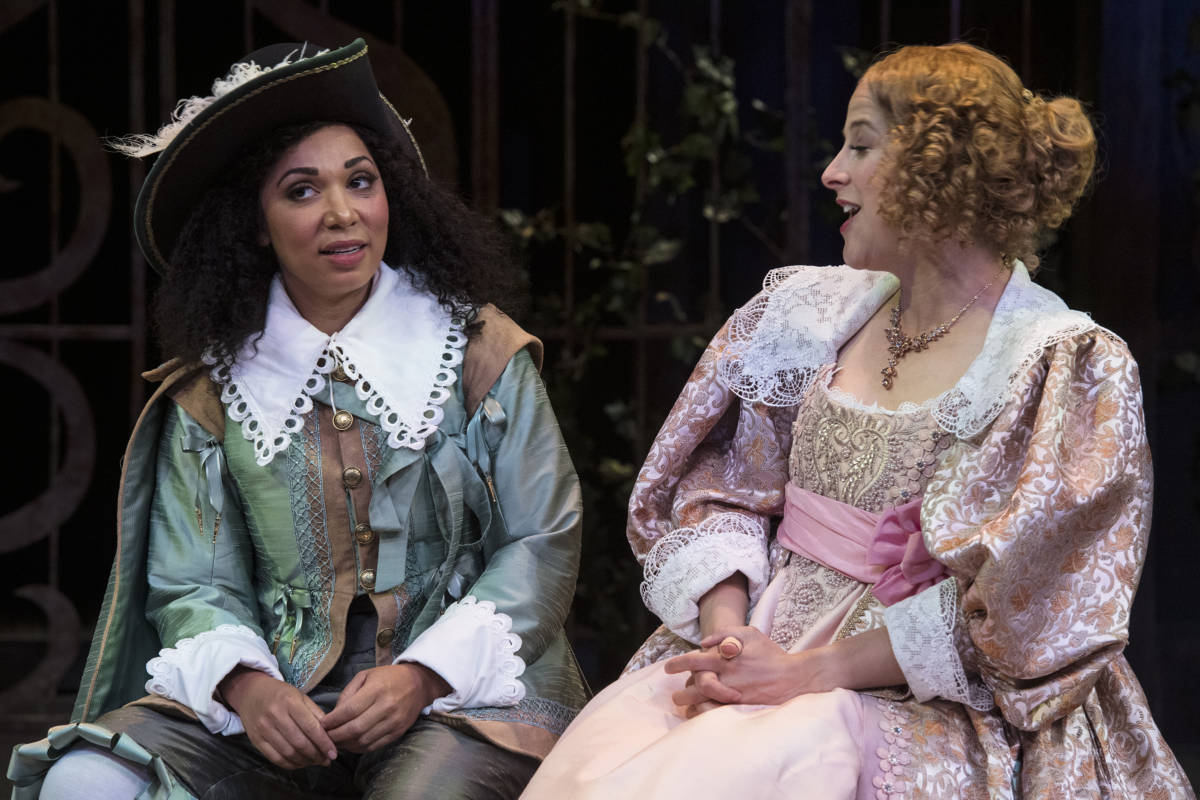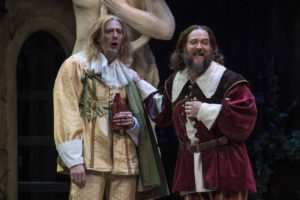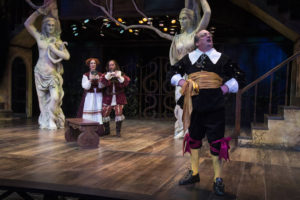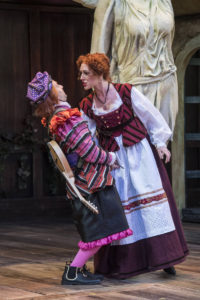
Sometimes you just need a fun play full of laughter and love. The Utah Shakespeare Festival’s current production of “Twelfth Night” is all that and more.
Audiences typically come away from “Twelfth Night” still giggling to themselves about the antics of Malvolio, the melancholy steward to Olivia. Shakespeare wrote Malvolio to be funny, and in this production, Chris Mixon plays the role to perfection, leaving the audience in stitches with his dry wit.
Although it’s often Malvolio who steals the show, the key to doing this play right is finding the right Viola. And USF’s production of the Bard’s classic comedy does just that. We laugh at Mixon, but our hearts are with Sarah Hollis as she plays Viola, one of the shipwrecked twins who finds herself stranded in Illyria, dressed as a man named Cesario and servant to Duke Orsino (René Thornton Jr.).
We mourn with Viola as she believes her brother, Sebastian (Tristan Turner) to be dead. We cringe with her when Olivia (Betsy Mugavero) falls for “Cesario.” We sigh with her when she falls for Orsino.
We already know the twists, which means we have the chance to go along on the delightful ride as these lovable characters discover them on their own.
The casting in general for this production is superb. Because USF is a repertory theater, all of them appear in other plays this season. And the cast for “Twelfth Night” gathers many of the best actors from all the other plays in one production.
Katie Cunningham, a standout this season as Lady Macbeth (“Macbeth”) and Rebecca Heminges (“The Book of Will”), is solid as Maria, Olivia’s chamber woman. She always seems to have a twinkle in her eye — almost a wink to the audience — as she reminds us that we’re in on the secrets of the mayhem and mischief, the magic and mystery of live theater.
Sadly, Shakespeare wrote the role of Olivia to be fairly flat and not nearly as exciting as many of his female roles. This doesn’t give one of the festival’s best actresses much to work with. But Mugavero takes that challenge and runs with it, enhancing the character beyond the written lines. Her expressions, when reacting to the other players on stage, is comic genius. And she delivers one of the best lines in the play, exclaiming “Most wonderful!” upon seeing not one, but two “Cesarios.”

While Feste (Trent Dahlin) is written as the official clown (fool) of the play, “Twelfth Night” is really a tale of four clowns, each of them trying to out-clown the others. In reality, it’s not Feste’s humor that makes his performances notable, it’s Dahlin’s musical talents that we remember as he performs on a lute throughout the play.
If it’s laughs we want, we only have to look to the duo of Sir Andrew Aguecheek (Josh Jeffers) and Sir Toby Belch (Todd Denning), whose antics remain entertaining throughout. Denning offers up a loveable, Falstaff-like take on Sir Toby, while Jeffers uses every inch of his lanky body to imbue Sir Andrew with best physical humor you’ll see at this year’s festival.

And then there’s Mixon as Malvolio, the accidental clown. He’s not trying to be funny — well, Mixon is, Malvolio isn’t — but Malvolio is always the funniest part of “Twelfth Night,” and Mixon brings an especially deft comedic touch to the role with his monotone laugh and that disturbingly hilarious smile. It will leave you wondering how many hours Mixon spent in front of a mirror perfecting that Joker grin.
What works so well about the comedy in “Twelfth Night” is not just any one performance. It’s not just Mixon or Jeffers, it’s how they all play off each other, which means that director Sam White deserves much of the credit for its success. This is White’s first time directing at the festival, and her solid work on this play should be enough to bring her back in future years.
Based in Detroit, White is also on the advisory board for Statera Arts, an organization designed to take positive action to bring women into full and equal participation in the arts. Festival regular Melinda Pfundstein serves as executive director of the organization, and she and White are two of the five women directing plays at the festival this season.
Other members of the artistic staff bring their own talents to the play. The scenic design by Apollo Mark Weaver is beautiful, and surprisingly detailed for the Engelstad Shakespeare Theater, which typically has sparse sets.
Fight directors are usually praised for realistic battle sequences and the like, but Benjamin Reigel deserves a nod for his work on the funny fish fighting scene. It has to be seen to be believed.
And because “Twelfth Night” is known for Orsino’s famous opening quote (“If music be the food of love, play on …”), we’ve come to expect productions to feature some element of music. Not only do we get Dahlin’s lute, but musicians Samae Allred, Ben Cano, and Isabella Giordano perform throughout, playing Lindsay Jones’ original, and wonderful, score under the direction of Brandon Scott Grayson.
Sadly, some members of the audience took these musical interludes as a sign that it was OK to talk to each other full volume and to continue to do so even as the actors began to speak. Combined with crinkling concessions and the inevitable cell phone ring — despite reminders at the beginning of every show to turn them off — these actions show a disturbing downfall in theater etiquette that is not only rude to those sitting around them but also to everyone on stage.

At least the play is charming enough to override audience rudeness. And even though “Twelfth Night” does employ the Bard’s overused mistaken identity trope, it’s easily the best of those plays. Modern stories often end with a twist or two — something that surprises the audience — and “Twelfth Night” has similar twist reveals.
Maria wrote the letter that made Malvolio act all crazy-like! Cesario is really Viola! Sebastian is not dead! But we know about all the twists from the onset of the play.
The real twist is that twinkle in Cunningham’s eye that reminds us about what works so well about “Twelfth Night”: We already know the twists, which means we have the chance to go along on the delightful ride as these lovable characters discover them on their own.
The Utah Shakespeare Festival’s production of “Twelfth Night” continues through Sept. 7 in the Engelstad Shakespeare Theatre at Southern Utah University’s Beverley Center for the Arts in Cedar City. Tickets are $20–$77. Visit bard.org or call (800) 752-9849.
Articles related to “Utah Shakespeare Festival’s ‘Twelfth Night’ delivers comedy, heart”
“Henry VI: 2 and 3” at the Utah Shakespeare Festival is long, uneven, and worth it
Visionary direction makes for a macabre “Macbeth” at Utah Shakespeare Festival
Charm, inside jokes minimize the tired tropes in “The Liar” at Utah Shakespeare Festival



